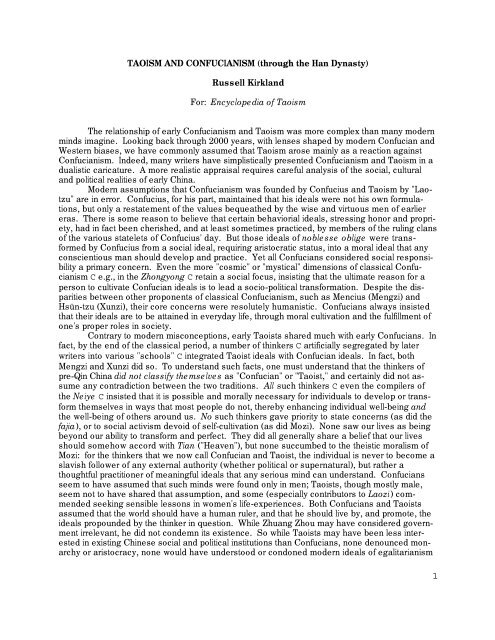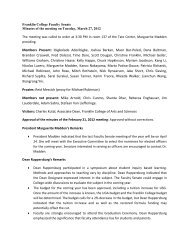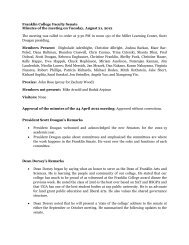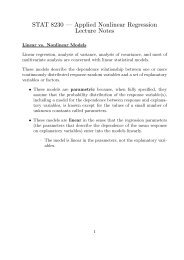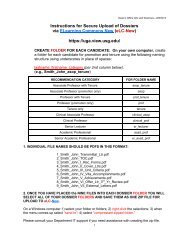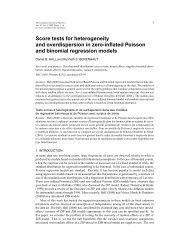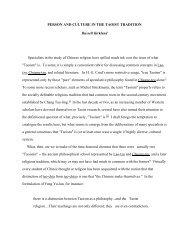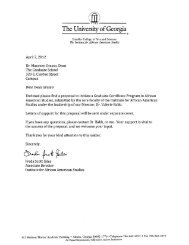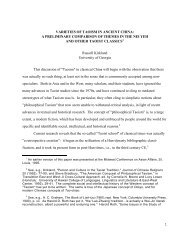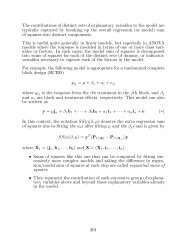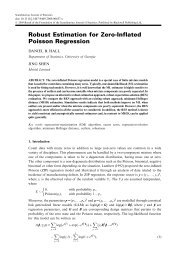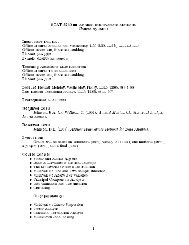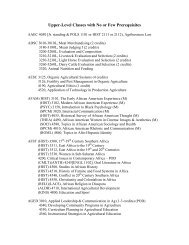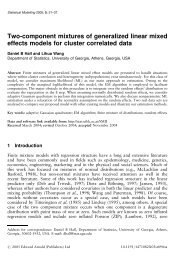TAOISM AND CONFUCIANISM (through the Han Dynasty) - Franklin ...
TAOISM AND CONFUCIANISM (through the Han Dynasty) - Franklin ...
TAOISM AND CONFUCIANISM (through the Han Dynasty) - Franklin ...
Create successful ePaper yourself
Turn your PDF publications into a flip-book with our unique Google optimized e-Paper software.
<strong>TAOISM</strong> <strong>AND</strong> <strong>CONFUCIANISM</strong> (<strong>through</strong> <strong>the</strong> <strong>Han</strong> <strong>Dynasty</strong>)<br />
Russell Kirkland<br />
For: Encyclopedia of Taoism<br />
The relationship of early Confucianism and Taoism was more complex than many modern<br />
minds imagine. Looking back <strong>through</strong> 2000 years, with lenses shaped by modern Confucian and<br />
Western biases, we have commonly assumed that Taoism arose mainly as a reaction against<br />
Confucianism. Indeed, many writers have simplistically presented Confucianism and Taoism in a<br />
dualistic caricature. A more realistic appraisal requires careful analysis of <strong>the</strong> social, cultural<br />
and political realities of early China.<br />
Modern assumptions that Confucianism was founded by Confucius and Taoism by "Laotzu"<br />
are in error. Confucius, for his part, maintained that his ideals were not his own formulations,<br />
but only a restatement of <strong>the</strong> values bequea<strong>the</strong>d by <strong>the</strong> wise and virtuous men of earlier<br />
eras. There is some reason to believe that certain behaviorial ideals, stressing honor and propriety,<br />
had in fact been cherished, and at least sometimes practiced, by members of <strong>the</strong> ruling clans<br />
of <strong>the</strong> various statelets of Confucius' day. But those ideals of noblesse oblige were transformed<br />
by Confucius from a social ideal, requiring aristocratic status, into a moral ideal that any<br />
conscientious man should develop and practice. Yet all Confucians considered social responsibility<br />
a primary concern. Even <strong>the</strong> more "cosmic" or "mystical" dimensions of classical Confucianism<br />
C e.g., in <strong>the</strong> Zhongyong C retain a social focus, insisting that <strong>the</strong> ultimate reason for a<br />
person to cultivate Confucian ideals is to lead a socio-political transformation. Despite <strong>the</strong> disparities<br />
between o<strong>the</strong>r proponents of classical Confucianism, such as Mencius (Mengzi) and<br />
Hsün-tzu (Xunzi), <strong>the</strong>ir core concerns were resolutely humanistic. Confucians always insisted<br />
that <strong>the</strong>ir ideals are to be attained in everyday life, <strong>through</strong> moral cultivation and <strong>the</strong> fulfillment of<br />
one's proper roles in society.<br />
Contrary to modern misconceptions, early Taoists shared much with early Confucians. In<br />
fact, by <strong>the</strong> end of <strong>the</strong> classical period, a number of thinkers C artificially segregated by later<br />
writers into various "schools" C integrated Taoist ideals with Confucian ideals. In fact, both<br />
Mengzi and Xunzi did so. To understand such facts, one must understand that <strong>the</strong> thinkers of<br />
pre-Qin China did not classify <strong>the</strong>mselves as "Confucian" or "Taoist," and certainly did not assume<br />
any contradiction between <strong>the</strong> two traditions. All such thinkers C even <strong>the</strong> compilers of<br />
<strong>the</strong> Neiye C insisted that it is possible and morally necessary for individuals to develop or transform<br />
<strong>the</strong>mselves in ways that most people do not, <strong>the</strong>reby enhancing individual well-being and<br />
<strong>the</strong> well-being of o<strong>the</strong>rs around us. No such thinkers gave priority to state concerns (as did <strong>the</strong><br />
fajia), or to social activism devoid of self-cultivation (as did Mozi). None saw our lives as being<br />
beyond our ability to transform and perfect. They did all generally share a belief that our lives<br />
should somehow accord with Tian ("Heaven"), but none succumbed to <strong>the</strong> <strong>the</strong>istic moralism of<br />
Mozi: for <strong>the</strong> thinkers that we now call Confucian and Taoist, <strong>the</strong> individual is never to become a<br />
slavish follower of any external authority (whe<strong>the</strong>r political or supernatural), but ra<strong>the</strong>r a<br />
thoughtful practitioner of meaningful ideals that any serious mind can understand. Confucians<br />
seem to have assumed that such minds were found only in men; Taoists, though mostly male,<br />
seem not to have shared that assumption, and some (especially contributors to Laozi) commended<br />
seeking sensible lessons in women's life-experiences. Both Confucians and Taoists<br />
assumed that <strong>the</strong> world should have a human ruler, and that he should live by, and promote, <strong>the</strong><br />
ideals propounded by <strong>the</strong> thinker in question. While Zhuang Zhou may have considered government<br />
irrelevant, he did not condemn its existence. So while Taoists may have been less interested<br />
in existing Chinese social and political institutions than Confucians, none denounced monarchy<br />
or aristocracy, none would have understood or condoned modern ideals of egalitarianism<br />
1
or radical individualism. To all of <strong>the</strong>m, no one is encouraged to discover or practice any "new"<br />
truth. Ra<strong>the</strong>r, one is to live <strong>the</strong> ideal life by finding and accepting one's real place within <strong>the</strong> existing<br />
world.<br />
Where Confucians and Taoists parted ways is that <strong>the</strong> former viewed "<strong>the</strong> world" primarily<br />
in terms of inherited socio-political norms, while <strong>the</strong> latter focussed on humans' continuities<br />
with <strong>the</strong> invisible dimensions of reality that Confucians were often reluctant to discuss. Modern<br />
interpreters, including scholars, often mistakenly suggest that such differences resulted from a<br />
Taoist concern with a reality called "Tao" that did not concern Confucians. O<strong>the</strong>rs, more simplistically,<br />
maintain that Confucians advocated activism while Taoists commended wuwei (nonaction).<br />
In reality, Confucius taught his followers to follow <strong>the</strong> correct and noble dao, and advocated<br />
wuwei by rulers, as did both <strong>the</strong> Dao de jing and such "Legalists" as Shen Buhai. Modern<br />
writers also generally ignore <strong>the</strong> fact that Mencius saw <strong>the</strong> cultivation of qi (see Neiye) as part<br />
of a gentleman=s self-cultivation. Such matters deserve much more attention as we reappraise<br />
Chinese traditions.<br />
2


